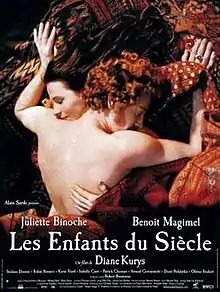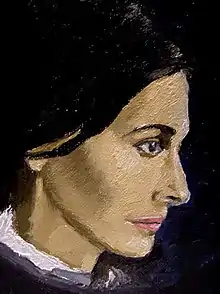Children of the Century
Children of the Century (French: Les Enfants du Siècle) is a 1999 French film based on the true tale of the tumultuous love affair between two French literary icons of the 19th century, novelist George Sand (Juliette Binoche) and poet Alfred de Musset (Benoît Magimel).
| Children of the Century | |
|---|---|
 Film Poster ©1999 Studio Canal | |
| Directed by | Diane Kurys |
| Written by | Diane Kurys Murray Head François-Olivier Rousseau |
| Produced by | Alain Sarde |
| Starring | Juliette Binoche Benoît Magimel Stefano Dionisi |
| Cinematography | Vilko Filač |
| Edited by | Joële Van Effenterre |
| Music by | Luis Enrique Bacalov |
| Distributed by | Studio Canal (France) Koch Lorber Films (USA) Film Four (UK) AE Classics (Australia) Alliance Atlantis (Canada) |
Release date |
|
Running time | 135 minutes |
| Country | France |
| Language | French |
| Budget | $14.5 million |
| Box office | $4.1 million[1] |
Plot summary

The story begins as George Sand quits her marital home and arrives in Paris with her two children. Meanwhile, the young poet and dandy Alfred de Musset is busy making a name for himself both as a womaniser and a talented poet and critic. Sand and Musset first meet at a literary dinner and quickly recognise in each other a like-minded love of literature. At first their relationship remains platonic, but soon the pair embark on a tumultuous affair that will lead them to Venice and the creation of their finest works of literature.
Background and production
The film was shot on location in Paris, Nohant and Venice from August to December 1998. In an interview with The Irish Times entitled "Playing with Sand", Diane Kurys revealed that she was shooting in the actual rooms Sand and Musset had occupied in the Hotel Danieli, while Juliette Binoche revealed that Sand's estate had loaned the production some of her possessions including a sapphire ring and jewel-encrusted dagger. When asked about her inspiration for the film, Kurys mentioned that Musset's account of the affair in his book La Confession d'un Enfant du Siècle was her starting point. Binoche said that her attraction to the part was due to "Sand's combination of strengths and weaknesses".[2]
Cast
- Juliette Binoche : George Sand
- Benoît Magimel : Alfred de Musset
- Robin Renucci : François Buloz
- Stefano Dionisi : Pietro Pagello
- Karin Viard : Marie Dorval
- Denis Podalydès : Charles-Augustin Sainte-Beuve
- Isabelle Carré : Aimée d'Alton
- Patrick Chesnais : Gustave Planche
- Olivier Foubert : Paul de Musset
- Marie-France Mignal : Madame de Musset
- Ludivine Sagnier : Hermine de Musset
- Robert Plagnol : Jules Sandeau
- Michel Robin : Larive
- Mathias Mégard : Eugène Delacroix
- Arnaud Giovaninetti : Alfred Tattet
- Pascal Ternisien : Boucoiran
- Victoire Thivisol : Solange
- Julien Léal : Maurice
- Jean-Claude de Goros : Capo de Feuillide
Premiere
Les Enfants du Siècle made its world premiere out of competition at the 1999 Cannes Film Festival before being released in French theatres on September 22, 1999.
The film made its North American debut at the 1999 Toronto International Film Festival.
The film made its UK debut as part of the Martell French Film Tour in September and October 2000,[3] followed by a conventional cinematic run starting on April 6, 2001.[4]
Film festivals
- Cannes Film Festival 1999 (out of competition - special gala screening)
- Toronto International Film Festival 1999
- Algerian Summer Film Festival 2000
- Budapest French Film Festival 2000
- Moscow French Film Festival 2000
- Martell French Film Tour 2000 (UK)
- Dublin French Film Festival 2001
- Warsaw French Film Festival 2001
Soundtrack
The soundtrack album to accompany the film was released by Decca Classics. The original music featured in the film consisting of a guitar and piano score was composed by Luis Bacalov. The film also features music by Ernst Eichner, Robert Schumann, Franz Liszt among others. The score was recorded in January 1999 by the Rome Symphony Orchestra and featuring Fábio Zanon on guitar and Leonid Kuzmin on piano. The album was supervised by Murray Head.
Track listing
All tracks composed by Luis Bacalov unless otherwise indicated:
- Les Enfants du Siècle (Guitar) (02:23)
- Les Confessions (02:57)
- Café Tortoni (02:30)
- La flûte désenchantée (01:54)
- Concerto in C major for harp and orchestra : Allegro (04:54) (Ernst Eichner 1740-1777)
- Arabeske in C, Op. 18 : IV Zum Schluss (01:24) (Robert Schumann)
- Le baiser (02:29)
- Le cœur qui bat (02:16)
- Papillons (01:16)
- La première fois (05:50)
- Beatrice di Tenda, opera seria in due atti (04:47) (Vincenzo Bellini)
- Désespoir (02:05)
- La guérison (02:16)
- Le Bal (02:51)
- Der Müller und der Bach (05:53) (Franz Liszt)
- Romanze (Piuttosto lento) (02:22) (Robert Schumann)
- Chez Delacroix (01:34)
- Le cheval mort (02:31)
- L'amour en fuite (02:30)
- Les Enfants du Siècle (Piano) (02:11)
Alternate versions
The film was released in 2 versions with different running times. The long version as released in France on September 22, 1999 has a running time of 135 mins. It begins as Sand abandons her husband and arrives in revolution torn Paris and Musset's father dies of cholera. A shorter version was released in Germany and the UK and other territories which runs at 105mins. It begins at the literary event at which Sand and Musset met and ends with their final meeting. The longer version goes on to show Sand's attempts to see the dying Musset, and ends with her reading her letters to him by his tomb.
Les Enfants du Siècle was released under the English-language title Children of the Century in the US by Koch Lorber Films, but retained its French-Language title while on release in the UK, Canada and Australia. The film was distributed in the UK by Film Four, in Canada by Alliance Atlantis and in Australia by AE Classics.
Books
Two books were published in conjunction with the film. Les Enfants du Siecle (ISBN 202037109X) is a novelization of the screenplay by François-Olivier Rousseau. Sand & Musset (ISBN 2732425575) is a large format coffee-table book exploring the history of Sand and Musset and the production of the film, co-written by Jean-Pierre Guéno, Roselyne de Ayala, and Diane Kurys, with lavish illustrations by Maxime Rebiere.
References
- "Les Enfants du siècle (1999) - JPBox-Office".
- "Following Sand's footsteps" (fee required). The Irish Times. 1999-03-20. Retrieved 2007-09-13.
- Demetrios Matheou (2000-10-01). "So, who's afraid of a few subtitles? We are". The Independent. Archived from the original (reprint) on 2008-03-28. Retrieved 2007-09-13.
- SF Said (2001-03-24). "French resistance". Telegraph Media Group. Archived from the original on 2008-03-25. Retrieved 2007-09-13.
_-_Walters_542394.jpg.webp)